On my last day in Lhasa I spent the morning hour in the Muslim quarter, which surprised me just by its pure existence in this stronghold of Buddhism.
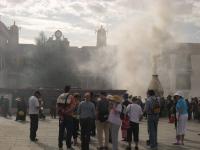
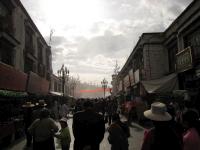
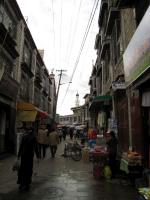
LS_20070627_092911.jpg: Not yet the Muslim quater…it is actually in front of the Jokhang Temple, which I visited three days ago. You might recognize the wheel with the two deers next to it. The intense smoke comes from insence burning, which is said to be heavier on Mondays, Wednesdays (as today), and Fridays due to these being the major pilgrimage days…for whatever reason.
LS_20070627_093212.jpg: The same smoggy appearance a few meters down the circular pilgrim way around the temple (this ways have a name…but I don’t have it handy right now).
LS_20070627_094247.jpg: Now finally: Down a small alley you’ll find the mosque’s minaret. The mosque could certainly not be visited by a non-moslem.
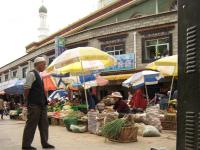
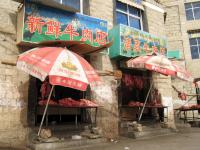
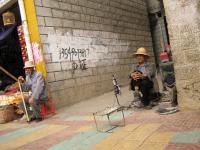
LS_20070627_094324.jpg: Right in front of the mosque a small but seemingly complete market. I haven’t seen good food markets in the Tibetian areas, probably due to be overrun by tourists, thus, now filled only with souvenir stalls.
LS_20070627_094710.jpg: Two butchers. A western eye would still prefer to find fresh meat cooled, but that’s simply not the case here. The first shop, according to its sign, promises “fresh beef meat” nonetheless. Just when a came across a weighty beef part was unloaded…from a just normal rickshaw. My attempt of a photo of that was unfortunately entirely blurred.
LS_20070627_094731.jpg: Street scene: Old man, probably Blues Brothers fan, but needs to work on the color of his outfit; and a showmaker waiting for clients.
The Monks and my Chinese
The rest of the day I spent in Liberation Park, reviewing some Chinese vocabulary. Surprisingly, my Chinese got worse these days. When given time, I can make up my sentences, but it’s tough in a conversation. Yesterday during dinner two monks sat next to us (you get used to all these monks around…even some in my hotel these days). I asked them as politely as my Chinese allows if we can sit our 5 people (the German, the 3 French, and me) next to them. Payam reminded me that adressing a Tibetian monk in Chinese is probably not a good idea…he might be right, but there was no other choice either. The monks were as fascinated by us as we by them and after some time a bit of a conversation started with me as the translator. Oh…my Chinese was so bad…they weren’t even able to understand as simple a word as “Shanghai”. We got that well-known place name confirmed only with the good old trick many Chinese use in case of difficulties in understanding: Drawing the characters into the air. Now you know why I learned reading/writing as well… 😉 As fun as the faltering conversation was (in the end they cheere to us with their water bottles, and in the rush I didn’t even remember so simple a thing like “bottle” in Chinese to order more beer for us…but we got it anyway) it reminded me that I should review Chinese a bit. And I made this my major target for the upcoming 4 free days, 2 in Lhasa, which ended now, and 2 on the train.
1 Yuan
Another funny side story I just remember of yesterday: I went to a toilet in Liberation Park. No, that’s not yet funny…keep reading: The cleaning lady apparently wanted to see money. I asked in Chinese how much, but these ladies are always afraid of talking to foreigners, although I would guess that she speaks Chinese well. She only held up two fingers. I found 2 Yuan quite much for these not really clean toilets, but who am I to start a quarrel here? I searched my pockets and found a 1 Yuan note and a 1 Yuan coin. I handed them over, she immediately pocketed the old crumpled paper bank note, but looked highly doubtfully at the new shining coin, raised her view questioningly at me and returned the coin to me with some words of which I couldn’t make out anything, probably Tibetian. Still hoping that I had misunderstood the high price and that she would probably return something to me I just waited a few seconds, but nobody moved. I offered the 1 Yuan coin again, saying this would be 1 Yuan, but she didn’t take it.
Well, the further north I came on my travel, the more often 1-Yuan-notes are used. In Shanghai everybody hates the notes, tries to get rid of them as early as possible, and sticks to the coins. But in other smaller northern cities like QingDao or YanTai I didn’t see coins, but only notes in use. And so it was in Lhasa, or even worse: I had not seen any single coin yet! Even the Jiaos (a tenth of a Yuan) circulate in bank notes only. Maybe this cleaning lady had never seen a coin before? I took out my wallet, found another 1 Yuan bank note there (even a fairly new one) and that the lady took gladly.
I wonder where I will be able to use my 3 remaining 1 Yuan coins…
By the way: The toilet fee is not 2 Yuan, but only 2 Jiao as I found out today. By pure luck I had exactly 2 1-Jiao-notes (returned from a supermarket), which the ladies at that toilet just accepted. 1.8 Yuan apprentice’s premium for a nice story…
Final notes on Lhasa
In preparation for 46 hours train ride tomorrow I bought a lot of apples, bananas, cookies, chocolate, and even green tea bags. Don’t want to entirely rely on the food offered to buy on the train. One main train and ferry staple are ready noodles, which is OK as a one-time snack, but not 3 times a day please! There should be a “restaurant” on board, but with 2 learned lessons on not being naive already I don’t trust that option either.
Tomorrow morning I will be taken to the train station. My train starts at 10:25 and is scheduled to arrive in ChengDu on Saturday morning, 08:30, i.e. 46 hours later. Likely no updates during this time to the site. Check again on Saturday evening!
Various people asked me already: What was Tibet like?
Tibet was a completely different experience. Very religious everything here. I can’t say if people are really strong believers, or if they just find the comprehensive buddhistic worshipping practices comforting, maybe giving strength and backing by the pure familiar character of reappearing actions. The people are different from all people I’ve met so far. Not only darker skin…it’s a slower pace here. Not this maddenning hurry of modern China. It’s also extremely poor. I didn’t give any money to beggars simply because I saw they were collecting Jiaos (10th of a Yuan) while I only had Yuan notes, which would be like giving 10 Yuan to a beggar in BeiJing who is usually happy about receiving a single Yuan (in BeiJing I did give sometimes…depending on mood and number of single Yuans in the pocket).
It’s still a different world. Being isolated from the rest of the world for hundreds of years can’t be undone in a matter of decades. But planes and trains are inevitably changing Tibet. It’s like with BeiJing’s Hutongs: We tourists shout to preserve them, but we don’t want to live in them. So BeiJing needs room for a modern world like ours for its own people, and flattens the Hutongs. Who to blame if something similar happens to Tibet? The way of achieving this is certainly an item of discussion, but I won’t start politicals here.
Up to now, being driven around as a single traveller, with car, driver, and private guide, gives you the definite feeling of being a snob. It might be exactly these experiences (and I didn’t go to any extremes) which change your attitude towards people, money, time, priorities; basically your attitude to life in general. I will know for sure only once being back in the west.
Today’s Lesson: 1 Yuan is not always 1 Yuan.
Categories: Asia, Lhasa
Originally Created: 06/27/2007 02:34:59 PM
Last Edited: 06/27/2007